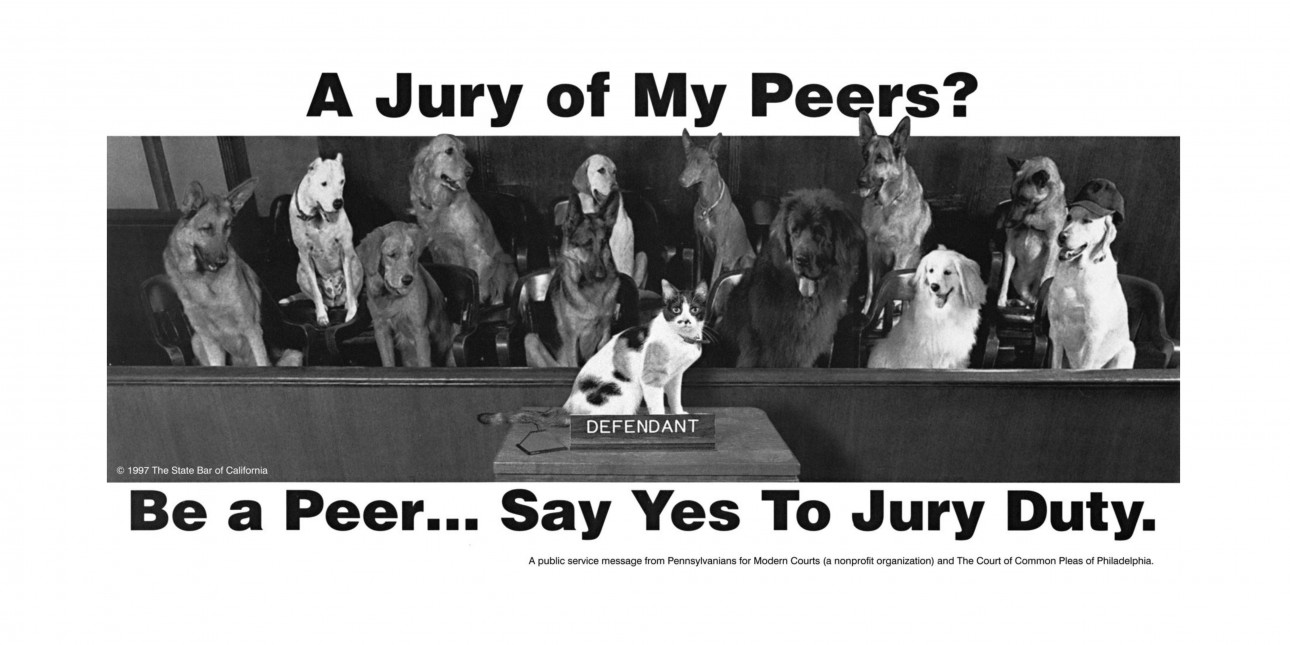Jury Duty FAQ

What kinds of cases will I hear as a juror?
Jurors hear either criminal or civil cases.
In criminal cases, a district attorney acting on behalf of the citizens of Pennsylvania prosecutes a case against an individual or an entity accused of a crime. The district attorney is also referred to as the prosecutor. The person or entity accused of the crime is referred to as the defendant.
What is the role of the juror, and what is the role of a judge?
JUROR
- Listen carefully to all evidence presented during the trial.
- During deliberations, discuss the evidence with fellow jurors and decided what the facts are, based upon which witnesses and evidence you believe.
- Apply the law, as explained by the judge, to the facts as determined by you.
- Do no independent research or investigation.
- Determine the money damages in some civil cases.
- In criminal cases, decide whether the defendant is guilty or not guilty.
- Arrive at a verdict.
JUDGE
- Make sure that all parties have a fair opportunity to present their case.
- Make sure the trial process proceeds in a proper manner.
- Instruct the jury on the applicable law.
- Decide the punishment in most criminal cases.
How are jurors selected?
Jury selection begins when a name is randomly selected from voter and motor vehicle registration lists. Those selected are sent a summons, which is a court order stating the required time and place to appear.
The jury pool is composed of those people summoned to appear on a particular day. Juries are selected from the pool.
In criminal cases, the jury is made up of twelve jurors, except in the rare case of the parties agreeing to fewer. In civil cases, the jury can consist of as few as six jurors or as many as twelve. Alternate jurors may also be chosen to avoid unnecessary delays or expense in the event of the incapacity of a juror.
What is voir dire?
Voir dire is a French term that refers to the preliminary examination of an individual's qualifications to be a juror. Voir Dire is sometimes conducted by the judge and sometimes by the lawyers. The purpose is to find out whether any views held by the potential juror hinder their ability to act impartially. Therefore, it is very important to answer these questions honestly.
Who is eligible to serve?
In most counties, anyone 18 years of age or older who is a United State citizen and resident of the county and who has not been convicted of a crime punishable by imprisonment for more than one year.
What happens if I ignore my summons for jury services?
A jury summons is a court order. If you ignore it, you are subject to arrest and prosecution.
May I call the court and schedule a more convenient time to serve?
In many cases, the court will do what it can to accommodate you. Call the court and find out. Don't simply ignore the summons.
Will I be paid for serving as a juror?
Juror pay and mileage/parking reimbursement varies by county. For example, in Allegheny County, jurors are paid $9/day for the first three days and $25/day thereafter, and they are compensated for mileage at a rate of 17 cents/mile. In Philadelphia County, jurors are also paid $9/day for the first three days and $25/day thereafter, but they are not reimbursed for mileage or parking. Contact your county's Jury Coordinator to acquire information about juror pay in your county.
What if my employer doesn't allow me to serve?
The law prohibits any employer from preventing an employee to serve as a juror. The law also prohibits an employer from depriving a juror of benefits because of jury services, such as requiring you to use vacation time to serve.
Is my employer required to pay me while I serve as a juror?
If you work for the government, your employer must pay you. If your work in the private sector, your employer does not have to pay you.
Is it possible to appear for jury services and not sit on a jury?
Yes. More people are called than actually serve because it is not always possible to estimate accurately the number of jurors who will be needed to serve each day.
How long will I serve?
Criminal trials do not usually last longer than two to three days. Generally, civil trials do not last longer than three to four days. however, some trials last longer.
May I go home at the end of the day?
Jurors almost always go home at the end of the day. Sequestration is a term used to describe jurors staying at a local hotel at the county's expense during the trial. Sequestration occurs rarely.
Are accommodations available if I have disability?
Under the Americans with Disabilities Act, accommodations must be made for people with disabilities. If you have a disability, contact your Jury Coordinator regarding accommodations.
What happens if I'm late and can't get to the court before the time the trial starts?
Call your Jury Coordinator or the judge assigned to your case as soon as possible.
How often do I have to serve as a juror?
There is no limit. In Pennsylvania, however, anyone who has served on a trial fewer than three days does not need to serve again for one year. Anyone who has served more than three days does not have to serve again for three years.